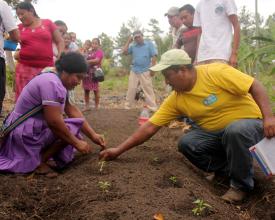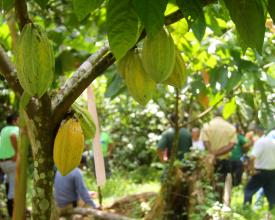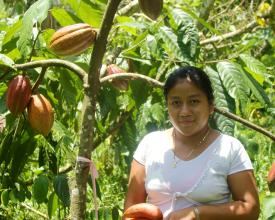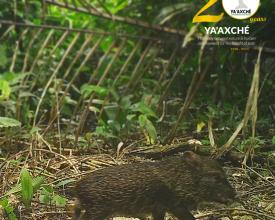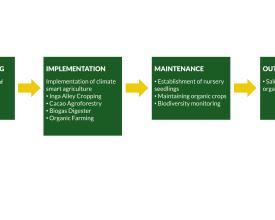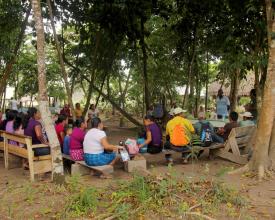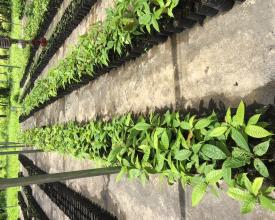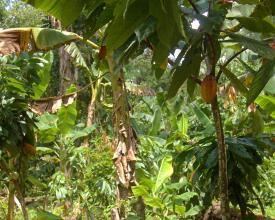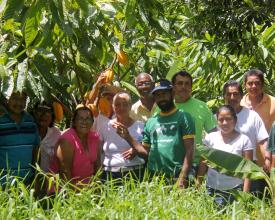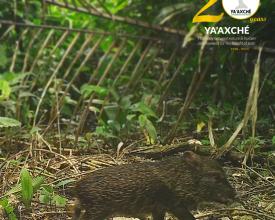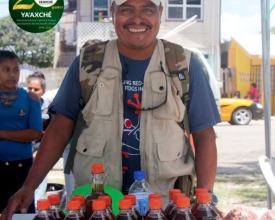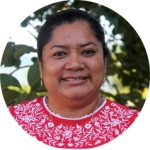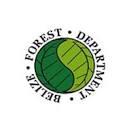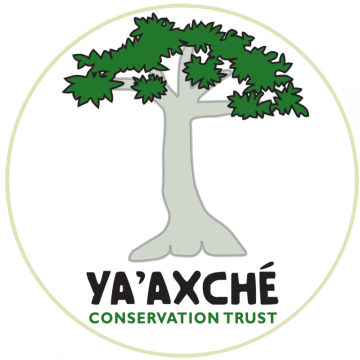
Indigenous Forest Conservation through Belize’s first Agro-forestry Concession
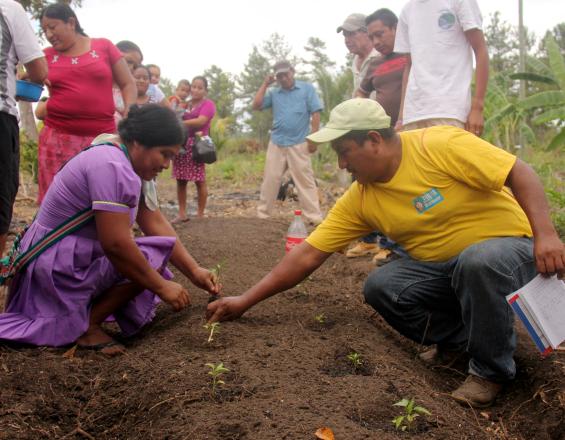
The Maya Mountain North Forest Reserve (MMNFR) is a diverse forest reserve measuring 36,000 acres and forms a part of the Monkey River watershed within Belize’s Maya Golden Landscape (MGL). Its proximity to the growing indigenous Mayan communities has subjected it to threats from illegal resource extraction of mahogany, cedar, bayleaf, overhunting, and deforestation from land clearance for agriculture. In 2012, Ya’axché supported the Trio Farmers Cacao Growers Association in gaining access rights within the MMNFR. By 2014, Ya’axché pioneered the establishment of Belize’s first agro-forestry concession. The Government of Belize granted a 15-year permit to implement a cacao-based agro-forestry concession on 936 acres within the MMNFR. This concession provides security to indigenous communites livelihoods while protecting the biological values of the MMNFR, and highlights the success of community-led integrated management approaches to conservation and sustainable community development.
Contexto
Défis à relever
Biodiversity/habitat loss from:
- Escaped fires from unsustainable agricultural practices such as traditional slash and burn.
- Deforestation as a result of slash and burn:Demand for agricultural land adds increasing pressure within the reserve.
- Illegal resource extraction:Illegal logging of mahogany, cedar, prickly yellow and bayleaf extraction are common infractions noted during patrols of MMNFR.
- Overharvesting of game species:Traditional hunting practices may lead to overharvesting.
Decreased water quality from pesticide/herbicide use from farms surrounding the MMNFR continue to threaten the water quality within the reserve.
Land degradation/soil erosion:Slash and burn agriculture leads to exposed soil surfaces, decreased soil fertility, soil erosion and land degradation.
Unsustainable crop yields from decreased soil quality from slash and burn agriculture.
Natural disasters:The hurricane season poses an annual threat to national agriculture industries.
Ubicación
Procesar
Summary of the process
The training and support of farmers in the initial phase of the project is vital, and is best carried out through a series of hands on workshops from professional consultants. The implementation of an agroforestry concession requires having a nursery of native, high yield, pest resistant crops. At this stage, the assistance of the supporting NGO or organization is vital to provide training so that communities can independently care for nursery species. The implementation of climate smart farming is the most important building block, and requires supervised planning and planting. Training and workshops ensure independent maintainance by farmers after introductory assistance by the NGO. The continued use of organic farming practices ensures the protection of water quality within the reserves. Biodiversity monitoring is done by the supporting NGO and serves to provide evidence of agroforestry benefits to native flora/fauna, but also to promote environmental awareness to the farmers themselves. The sale and marketing of organic produce secures the livelihoods of indigenous communities and allows the long-term management of reserves by these communities while also supporting sustainable development.
Building Blocks
Training and support of indigenous farmers
Ya’axché supports indigenous farmers of the Trio Farmers Cacao Growers Association (TFCGA) with training on climate smart agricultural methods such as agro-forestry, Inga-alley cropping, organic farming and beekeeping. Training in proper climate smart agricultural techniques ensures that the agroforestry concession is providing benefits to both humans and nature.
Enabling factors
Through the Community Outreach and Leadership program at Ya’axché, workshops on basic climate smart agriculture techniques were held following Ya’axché's Integrated Farming Manual. In addition Ya’axché regularly engages farmers in visits to climate smart demonstration farms within the concession that exhibit the benefits of these methods.The demonstration plots were developed by TFCGA farmers with the aid of Ya’axché support staff.
Lesson learned
Ya’axché has found that hands-on learning/workshops and demonstration plots are most effective in training of farmers as they are able to see concrete outcomes of the climate smart methods we promote. In addition, most of our technical support staff are farmers themselves who implement these practices on their personal farms and are able to offer personal insight.
Resources
Establishment of nursery seedlings
The establishment of a nursery supports high yield local cacao varietals, fruit and timber species to encourage growth of climate smart agroforestry farms. This ensures sustainability and productivity of agroforestry plots and supports promotion of these methods to new farmers.
Enabling factors
With the support of Ya’axché technical staff, Trio Farmers Cacao Growers Association constructed a one-acre nursery on the concession. In addition, the maintenance and watering of seedlings/saplings in the nursery is done by wives and children of Trio farmers.
Lesson learned
The nursery serves to help new farmers start their own climate smart agriculture farms as well as ensure future research into high yield varieties of plants.
Implementation of climate smart agriculture methods
The Maya Mountain North Forest Reserve Concession utilizes climate smart agriculture such as agro-forestry and Inga-alley cropping. Both of these methods combine agriculture with conservation of trees to create a sustainable land-use system, which increases carbon sequestration and crop yield. In addition, Inga-alley cropping uses species such as Inga edulis and Inga fueillei (leguminous, nitrogen-fixing trees) to improve soil health and reduce use of herbicides. With the preservation of permanent shade trees, and the planting of temporary shade trees and fruit trees, the cyclical production of the farm provides a sustainable yield that maximizes all products on the land. Planting Inga trees in rows supports a healthy yield of integrated fruit trees that are nurtured by the improved soil fertility provided from Inga species. This system reduces the amount of land needed for planting and provides valuable secondary uses like firewood, mulch and pest control.
Enabling factors
The acquisition of the agro-forestry concession granted access to 936 acres for cacao-based agriculture within the Maya Mountain North Forest Reserve. Areas for planting were chosen using remote sensing to identify land that had already been used in the past. In addition a new set of roads/trails were built to provide access to the concession.
Lesson learned
A clear idea of climate smart agricultural methods is needed before implementation. Training/workshops for farmers is vital to properly implement these methods.
Ya’axché has learned that the future success of the concession means that research into shade management and yields will need to be done to maintain good practices.
Maintaining organic crops
The Maya Mountain North Forest Reserve makes up a vital part of the Monkey River Watershed, which supports livelihood of many communities. The prohibition of pesticides and herbicides through organic farming ensures maintenance of water quality to support aquatic species and provide healthy water to communities.
Enabling factors
By employing climate smart agricultural methods such as Inga-alley cropping, and agro-forestry, the need for herbicide and pesticides is naturally reduced. In addition, Ya’axché support staff offered technical training on organic pest control methods.
Lesson learned
The advice of a consultant is vital to ensure proper methods of organic farming are used. Ya’axché has provided training to farmers in agro-forestry and organic pest reduction techniques through a hired consultant, Dr Reuben Sanchez from the Instituto de Investigaciones Fundamentales en Agricultura Tropical Alejandro de Hunboldt in Cuba. There were a total of 7 workshops in an introduction to agro-ecological principles with a focus on cacao and coffee pest management, seed selection, collection and storage, biogas, mulching.
Continuous biodiversity monitoring
Ya’axché’s Protected Areas Management program conducts monitoring of bird and mammal species within the concession to track wildlife ecosystem health and inform decision making within the concession.
Enabling factors
Through Ya’axché’s Protected Areas Management program, regular monitoring of bird/mammal species are conducted through camera trapping and point counts from Ya’axché rangers.
Lesson learned
Monitoring is essential to determine whether the agroforestry concession is able to support wildlife and biodiversity. A short pilot study was conducted in 2016 as a first attempt at documenting biodiversity within cacao-based agro-forestry farms. Five cacao farms were chosen. Fifteen out of 31 species of indicator birds were documented within the farms. Fourteen species of mammals of which six species are considered indicator species were documented through the camera traps. This shows that agro-forestry supports a diverse array of wildlife species within the reserve.
Sale and marketing of organic products
Trio Farmers Cacao Growers Association growers are able to maintain sustainable livelihoods through the sale and marketing of organic Belizean cacao, honey and vegetables.
Enabling factors
Ya’axché support staff provides annual training of plot management skills and business planning and marketing.
Lesson learned
Sale of organic products secures a unique and profitable market to support indigenous livelihoods.
Impacts
Increased biodiversity through habitat conservation: 15 avian indicator and 14 mammal species have been observed on the concession. Agroforestry methods support and maintain wildlife habitat.
Decreased fire risk: A diversion from slash and burn methods along with fire management training has reduced the frequency of escaped fires.
Decreased illegal activity in the reserve:Patrols on the reserve by Ya’axché rangers provides data on frequency and location of illegal activity.
Improved water quality:Climate smart farming has eliminated use of herbicides/pesticides and contributes toward improving water quality in the reserve.
Improved soil quality:Climate smart agriculture contributes toward increased carbon sequestration, soil fertility/quality, and decreased erosion rates.
Provision of sustainable livelihoods:Cyclical provision between interim cash crops and mature cacao yield increases sustainability through the regular sale of organic products. The addition of apiculture provides additional sources of income.
Resilience to climate change:Climate smart agriculture provides resilience in the face of natural disasters by preservation of shade trees that protect understory crops.
Increased awareness of forest conservation:Within the MMNFR concession, 100% of the farmers utilize climate smart agriculture. The concession serves as a national example of community-led conservation in Belize.
Beneficiaries
- Trio Farmers Cacao Growers Association
- Present and future residents of indigenous communities within the Maya Golden Landscape: Trio, Medina Bank, Golden Stream, Indian Creek, Silver Creek, San Miguel, and Big Falls
Sustainable Development Goals
Story
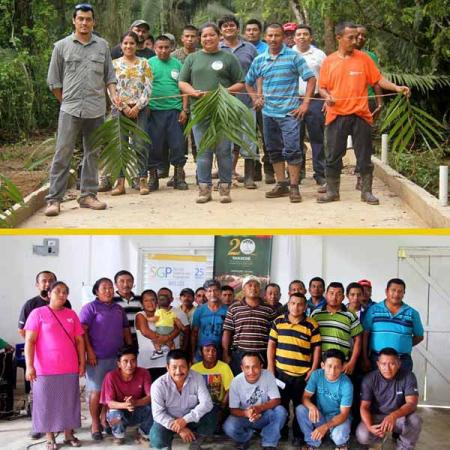
Thirty one farmers in Toledo are celebrating their 4th year of successful farming in Belize’s first agroforestry concession within a protected area. Ya’axché Conservation Trust is working with farmers to ensure that both the environment and community livelihoods are considered in protected area management.
In 2012, 30 landless farmers with interests of farming within Maya Mountain North Forest Reserve made contact with Ya’axché to support their aspirations. Ya’axché, along with the farmers, developed an agroforestry management plan to guide the cultivation of cacao under the forest canopy and created a conservation agreement that incorporated the commitment of the farmers to protect the area of natural wonder. In June of 2014, the Government of Belize granted the establishment of Belize’s first agroforestry concession within a protected area to the newly formed Trio Farmers Cacao Growers Association.
To date, the farmers have planted over 58,000 cacao trees covering 165 acres, within the 936-acre agroforestry concession. In addition to cacao, the farmers have produced 3,000 plantains, 8,712 pounds of corn, 800 pounds of honey, and harvested significant quantities of vegetables. By 2019, each farmer will have increased their harvest by planting an additional four acres of cacao.
The agroforestry concession has addressed the increased demand for agricultural land from growing indigenous communities while diverting from destructive traditional practices such as slash and burn. The reserve ecosystems are conserved through climate smart agriculture, and indigenous communities are able to play a vital role in their protection.
Ya’axché Conservation Trust has been empowering communities and conserving wildlife in southern Belize since 1998. Much of the organization’s effort has focused on promoting sustainable farming practices. The success of the agroforestry concession model within Maya Mountain North Forest Reserve can be used in other protected areas, such as forest reserves. This model considers the sustainable development of indigenous communities and the protection of nature in key biodiversity areas in the tropics.

